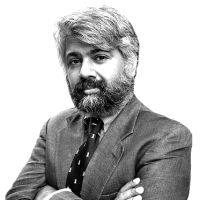If Hollywood were ever to make a film about a nihilistic leaker-hacker dude, a rootless subverter of international public order, they couldn’t do better than to cast Julian Assange as himself.
With his bloodless, sallow face, his lank hair drained of all color, his languorous, very un-Australian limbs, and his aura of blinding pallor that appears to admit no nuance, Assange looks every inch the amoral, uber-nerd villain, icily detached from the real world of moral choices in which the rest of us saps live. Call him the Unaleaker, with apologies to the victims of Ted Kaczynski.
Assange is the founder and prime mover of WikiLeaks, a shadowy, show-offy little outfit that last week unloaded into the public domain vast quantities of classified American military intelligence stolen from the vaults of the war in Afghanistan. And in doing so, Assange, who expresses his credo in repeated, almost catechistic condemnations of American “war crimes” and in a naked disdain for capitalism, appointed himself to the role of anti-establishment truth-seeker. He is the insurgent-in-chief, waging ascetic, selfless combat against warmonger-criminals in the White House and the Pentagon. He has craved acclaim, and has got it from some quarters. The Guardian newspaper, in particular, appears to be egging him on in the tone and extent of its coverage. Inevitably, the almighty fray provoked by Assange has attracted the attention of journalism school professors, one of whom, his NYU bosom heaving, doubtless, from the excitement of it all, described WikiLeaks as “the world’s first stateless news organization.”
But watching Assange wallow in the attention that has followed his voluminous data dump, one is struck by his strut, his hubris, his palpable vainglory. “I enjoy crushing bastards,” he crowed to Der Spiegel, one of the publications favored with the right to publish his dubiously acquired material. “The most dangerous men are those who are in charge of war,” he harrumphed. “And they need to be stopped.”
This last statement only partly answers a question that has been troubling America for some days: What does Assange want? He doesn’t like war, it is clear, so war must be “stopped.” But in his various pronouncements since the leaks were published, in his ramblings in response to questions from bona fide journalists, he has revealed no trace of humility, professed not even a sliver of doubt, accepted not one utterance that would challenge his own convictions and certitudes. The dream state of his own omniscience has remained entirely unimpaired.
WikiLeaks is a brothel of self-promotion, Assange its puffed-up pimp.
• Philip Shenon: WikiLeaks Probe Heats Up • Full coverage of WikiLeaksWhen asked at a London press conference whether he thought his leaks would compromise national security, Assange’s “visibly annoyed” response (per this report) stripped bare the adamantly adversarial quality of his mind-set: “You often hear that something may be a threat to U.S. national security. This must be shot down, whenever this statement is made.”
For the security of the numerous Afghan informants who work with U.S. troops, he cares not a jot. As The Times of London has pointed out, hundreds of names of such local collaborators in the war effort can be found in the documents in the WikiLeaks archive, including details of their villages. How does Assange justify putting these people at mortal risk? Predictably, he does not, taking refuge behind a weasel-worded insistence that he and his team had edited the material so that there was “harm minimization,” a morally teasing phrase that might, so ironically, be part of the Pentagon’s own lexicon. So are we to assume that the Afghan informants whose names were left in the WikiLeaks texts amount, in Assange’s reckoning, to an acceptable quantum of collateral damage in his Quixotic war against the warmongers?
What does Assange want? Does he really want the free world to cringe under constant threat from al Qaeda? If we fail to defeat this threat, what does Assange think will happen? Do we have any sense that he cares? Or is it the case, frighteningly, that Assange doesn’t really “want” anything, in a programmatic, civilizational sense, and that these explosive episodes of “gotcha” leaks are an end in themselves, a personal moral terminus, a sort of self-righteous, self-congratulatory onanism?
These latest leaks weren’t, of course, Assange’s debut on the world stage. This episode was preceded by “Collateral Murder,” his own Breitbart Moment, when he infamously edited the leaked video of a gunship attack by U.S. forces in Iraq to make it appear more damnable. How is that different from the editing, by Andrew Breitbart, of the clip of the lady from the U.S. Department of Agriculture at the NAACP meeting? The New York Times wouldn’t touch anything Breitbart was peddling, but it gave Assange, who professes not to know where these documents came from, the full Pentagon Papers treatment.
Unless there is evidence that Assange conspired with employees of the military to procure these leaked materials, there is no scope in the law to take action against him. But let us put the law to one side. Our aversion to Assange and his ways—to his posturing, gaudy psuedo-insurgency—need not be expressed in ways prosecutorial. Let us, instead, shower him with our most basic contempt, and dismiss him as the fraud that he is. WikiLeaks is a brothel of self-promotion, Assange its puffed-up pimp.
Tunku Varadarajan is a national affairs correspondent and writer at large for The Daily Beast. He is also the Virginia Hobbs Carpenter Fellow in Journalism at Stanford's Hoover Institution and a professor at NYU's Stern Business School. He is a former assistant managing editor at The Wall Street Journal. (Follow him on Twitter here.)






